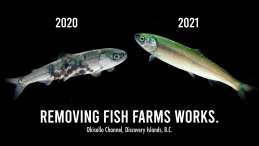Open Letter to the Leaders of Canada's Political Parties
New International Alliance takes Canada to task over Salmon Aquaculture
September 17, 2021 VANCOUVER: A new alliance of citizen activists known as Global Salmon Farm Resistance issued an open letter to Canada’s political leaders today, calling for immediate action to protect wild salmon and herring from open netpen salmon farms. The alliance has representation from all of the countries where salmon farming threatens wild stocks of fish and other marine life and displaces traditional coastal economies. The membership includes internationally renowned conservationists Sylvia Earle (former chief scientist at the US National Oceanic and Atmospheric Agency), Frederik Mowinckel (eco-industrialist and environmental activist) and Yvon Chouinard, founder of Patagonia and the corporate philanthropy program “1% for the Planet”.
“Canada has begun the work of transitioning salmon farms out of the ocean in British Columbia,” said Karen Wristen, Executive Director at Living Oceans Society, a member of the new alliance. “But there is no clear plan moving forward. Our salmon and herring stocks are collapsing at an alarming rate, threatening the entire coastal ecosystem. With 75% of British Columbians firmly opposed to open netpen salmon farming, we expected clearer commitment from all political leaders as to how and when they’ll get the job done.”
Globally, a handful of multinational corporations control the salmon aquaculture industry, which raises primarily Atlantic salmon and some Pacific Chinook in Canada, the US, Chile, Australia, New Zealand, Norway, Scotland, Ireland, Denmark and the Faroe Islands. In every country where wild salmonids share waters with salmon farms, the wild stock has plummeted.
“Western Scotland’s and Ireland’s wild sea trout and salmon, Norway’s wild Atlantic salmon, eastern Canada’s wild Atlantic salmon and now many populations of BC’s wild Pacific salmon—all collapsed. While there are multiple contributing factors in all of these declines, salmon farming is the constant factor. Infestations of salmon lice on the farmed stock turn the farms into incubators for this deadly parasite. No salmon farming nation has come up with a solution,” said Frederik W. Mowinckel.
“Disease transfer from farmed to wild stock is emerging as a key issue in the poor early-ocean phase survival of wild salmon,” said Alexandra Morton, an independent biologist. “Just as COVID-19 is spread among humans in close quarters, so are fish diseases amplified on salmon farms. And because the salmon waste is released directly to the marine environment, the pathogen load around salmon farms can be exceptionally high, exposing young wild salmon as they emerge from their natal streams. In a word, salmon farms are pathogen superspreaders.”
The global push-back against ocean-based salmonid farming is gaining momentum. In 2018, Washington State banned Atlantic salmon farming, joining the rest of the US Pacific seaboard in prohibiting that industry. In 2019, Denmark put the brakes on its ocean-based rainbow trout farms, citing nutrient overloading on its formerly very productive, shallow coast. In 2020, Canada shut down one of the most productive salmon farming regions in the country, the Discovery Islands on the Pacific coast, when First Nations raised concerns about salmon lice and disease organisms impacting their right to harvest wild fish. And in 2021, Argentina became the first country to ban salmon farming outright before it got started, when the provincial government of Tierra del Fuego banned the practice in Patagonia, the only Argentinian region capable of sustaining salmon farms.
The full text of the letter sent today by Global Salmon Farm Resistance can be found here
-30-
-30-
Contact Information
Karen Wristen, Executive Director, Living Oceans Society 604-788-5634
Frederik Mowinckel Frederik [at] mowinckel.com
Alexandra Morton 250-974-7086

